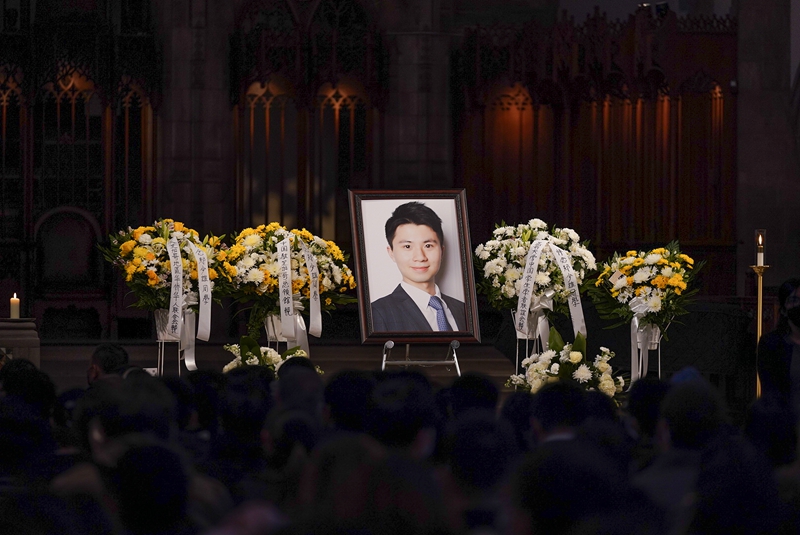'My dearest son, traveling abroad for the first time in my life, I am not here to go sightseeing, nor to attend your graduation or wedding; I am here for your funeral,” Li Rong sobbed when speaking at her son's memorial service thousands of miles away from home.
It was the ninth day after her 24-year-old son, Zheng Shaoxiong, a University of Chicago (UChicago) alumnus, was killed near campus. On November 9, Zheng, who had recently graduated from the university with a master's in statistics, was on his way back to his rented room on a sidewalk in the Hyde Park neighborhood when he was robbed and shot in the chest. Despite a nearby doctor performing cardiopulmonary resuscitation and the hospital being just half a block away, Zheng was pronounced dead in less than 20 minutes.
Just two days before the incident, Li had received a birthday gift from Zheng, a bottle of perfume mailed from Chicago to Sichuan Province. She never knew her first trip outside China would take her to her son's funeral.
"Together with me stand thousands of mothers," Li said at the end of her speech, fighting back her tears. "As a mother, I strongly call for the enhanced protection of each overseas student to prevent such a tragedy from happening again." Zheng was the second Chinese student to be killed in Chicago this year.
One week after Zheng's death, over 300 UChicago students, alumni, faculty and community members gathered on the main quad on November 16 for a rally with the slogan, "We are here to learn, not to die," reported The Chicago Maroon.
The rally, organized by more than 40 students, demanded the university implement measures to increase safety and security, such as extending the hours that ride-hailing services are available to students, and increasing the number of stops and the frequency of after-hours bus services. Rally organizers also called on the university to establish a real-time alert system, provide students with annual safety and security training, as well as cover students with comprehensive life insurance.
Facing death
Zheng's death also marked the third shooting of a UChicago student this year. The tragedies alerted students, especially Chinese students, to the precarious personal security situation on their dream campus, far away from home.
"Shaoxiong's incident makes me feel like a bullet can strike at any given time," said Shi Qingqing in an online discussion with some 30 Chinese international students on November 16, most of whom were from UChicago. "When you are not capable of changing the rules, you have to learn to adapt and protect yourself properly."
"Many foreign students come from nations where there is little to no gun-related violence, and they quite understandably find it difficult to comprehend the extreme criminal danger that occurs in conjunction with guns in the United States," Harvard Professor of Constitutional Law Adrian Vermeule said in a written interview with Beijing Review. Vermeule worked at UChicago for seven years.
"We have a common enemy: guns and gangs," said Lori Lightfoot, Mayor of Chicago, in August after a traffic stop left one police officer fatally shot and another partially paralyzed, according to Injustice Watch.
During the first seven months of 2021, there were 1,973 shootings in the city of Chicago, with 2,471 victims, representing a 67-percent and 63-percent increase over the 2019 figure respectively, according to statistics released by the Chicago Police Department (CPD).
"The spread of COVID-19 has increased the prevalence of social problems in the United States," said a Chinese student at UChicago who declined to give his name. "I thought the shooting incidents might increase, but not to this radical level."
Li Xinyue, a student enrolled in UChicago's Master of Public Policy program, found herself lost in the gap between academic research and reality. "Am I wrong to have chosen this major?" she asked. "When we sit in the air-conditioned classrooms talking about order and violence, getting lectured by decently dressed professors, violence is happening, right here, right now. How ironic!" Shi added. But they are hopeful and regard their experiences in the U.S. as part of the world they want to observe.
A number of students took action to raise their concerns and asked for more concrete measures regarding student safety. Zhu Hongding was one of them. He participated in the online meeting on the same day he joined the rally as an organizer.
Participating in the rally did not bring Zhu the comfort he expected and he was still a little emotional at the beginning of the online meeting. "We have rarely been exposed to this kind of violence or danger before. We used to believe we could make a difference simply by working or studying hard," he said, adding that the world in reality might be totally different from what they had learned from books.
He believed in the power of action: "We should have the courage to face this anxiety before we act."
United, they stand
Following the rally, university, community and CPD leaders joined Mayor Lightfoot on November 20 for a conversation about collaborative, community-based strategies to improve safety across the city, according to the university's website.
President of UChicago Paul Alivisatos said the university is identifying opportunities to leverage its strengths in academic thought and practice, working in tandem with South Side communities, to address critical issues, including mental health, education, child welfare, social policy and economic opportunity.
"To identify the most at-risk kids early on and connect them with community interventions and programs is regarded as essential in creating a positive influence in their lives that will outweigh the negative," said Karen Freeman-Wilson, President and CEO of the Chicago Urban League.
Economic downturn could be the No.1 underlying factor of the recent wave of gun violence. It may have increased the economic motive behind muggings and some of those robberies can escalate into shootings, according to Vermeule.
In Vermeule's eyes, the city and university are now committing more resources to policing in the area. "However, the Hyde Park has been through this cycle before. Crime dies down for a while, then police presence is reduced, and then the cycle begins again," he said.
He showed grave concern over visiting Chinese students' mental health and worried that they might take stringent precautions and isolate themselves from the broader university community in an understandable bid for self-protection.
"I believe that in order to reduce the Sino-phobia that unfortunately afflicts some of the American professional and intellectual classes, the only way forward is deeper engagement and cultural exchange between students, scholars and other professionals from both nations," Vermeule said.















